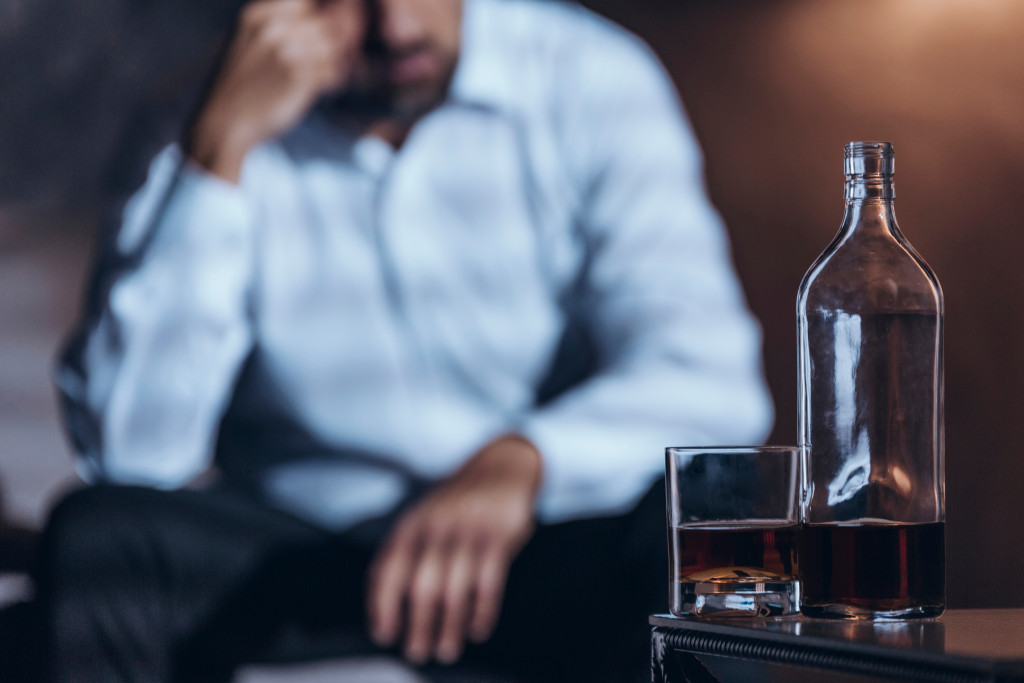- Alcohol addiction is a serious issue with long-term physical and psychological damage, which can be caused by various factors such as family history, availability of alcohol, peer pressure, and mental health issues.
- To start recovering from alcohol addiction, you must identify and avoid triggers that can lead to cravings or an urge to drink.
- Professional help should be sought if necessary to ensure success on the path toward recovery. This could include therapy, medication, and inpatient rehab services.
- Healthy habits should be developed to maintain sobriety, such as regular exercise, nutritious meals, and engaging in activities that bring joy and fulfillment.
Alcohol addiction is a severe problem with far-reaching consequences. Unfortunately, alcohol abuse has become widespread in many societies around the world. People often turn to alcohol for relaxation or to cope with stress, but it can quickly lead to addiction and long-term physical and psychological damage.
Several factors can contribute to the development of alcohol addiction, such as family history, availability of alcohol, peer pressure, mental health issues or underlying trauma, or frequent exposure to stressful situations. Genetics can also play a role in making some people more prone to developing an addiction than others.
When someone becomes addicted to alcohol, it’s because they have lost control over their consumption – they need more and more to feel normal and will continue drinking despite knowing full well the harm they are doing themselves and those around them. Alcohol addiction has been linked with various social problems, such as unemployment, marital conflict, relationship problems, crime, and domestic violence.
Knowing the consequences of alcohol abuse, you might want to take steps to break the cycle and learn how to get better. Recovery is possible, and many resources are available to help you or a loved one on their journey toward wellness. Here are a few to consider if you want to change for the better.
Identifying Your Triggers

Staying away from triggers when recovering from alcohol abuse is essential for success. Triggers are anything that can lead to cravings, or an urge to drink, which may be people, places, feelings, or even certain activities associated with drinking in the past. Identifying and avoiding these triggers is a crucial part of the recovery process, as it reduces the chance of relapse.
One of the first steps in staying away from triggers is to avoid environments where alcohol is easily accessible, and consumption is encouraged. This includes bars and other social settings where drinking may occur. It may also mean avoiding certain people who could influence or encourage you to drink. It’s essential to clearly understand what triggers your craving for alcohol and take proactive steps to stay away from them.
Here are a few common triggers you might want to avoid:
Peer pressure
Being around friends or family who drink can be a significant trigger, so it’s essential to set clear boundaries and know when to say no. Instead, you can find other ways to bond with them.
Emotional triggers
Specific emotional states, such as depression, anger, loneliness, and boredom, can lead to increased alcohol cravings. If you feel these emotions more often than not, it might be time to get help from a mental health professional.
Behavioral triggers
Watching others drink or participate in activities associated with drinking in the past can also be triggering. It’s essential to stay aware of your behavior and keep track of what might cause you to crave alcohol again.
Habitual activities
Sometimes, drinking can be a lifestyle. You might have certain habits while drinking, like going to the same bar every weekend or playing cards with friends after work. To avoid relapse, you must find healthier ways to fill the void where these activities were and find alternate activities that don’t involve alcohol.
Seeking Professional Help
Although the support of family and friends is invaluable when recovering from alcohol addiction, seeking professional help can be beneficial in many ways. A qualified mental health professional can provide guidance on managing cravings, teach healthier coping skills for dealing with stress, and help you recognize potential triggers before they become overwhelming.
A combination of therapy and medication is often needed to manage alcohol addiction successfully. Many people find that drugs like acamprosate or naltrexone help reduce cravings and make it easier to stay sober. However, these should only be taken under the supervision of a doctor as there may be side effects depending on your medical history.
Inpatient alcohol rehab services can also help provide a safe environment and professional support to help you recover. They provide access to medical professionals, therapists, counselors, and other resources to ensure you have the best chance of success.
Develop Health Habits
Developing healthy habits and routines is essential to make sure you stay sober. This includes getting regular exercise, eating nutritious meals, maintaining a positive attitude, and taking care of yourself mentally and physically. Regularly engaging in activities that bring joy or fulfillment can reduce the likelihood of relapse.
These activities don’t have to be expensive or time-consuming—they could be something as simple as going for a walk every morning or reading an exciting book. It may also help to find an activity you can do with others who support your recovery journey, such as joining a support group.
Final Thoughts
The journey of recovery isn’t always easy. Still, with the proper support and tools, it is possible to reclaim your life and live a healthier, happier existence free from alcohol addiction.

